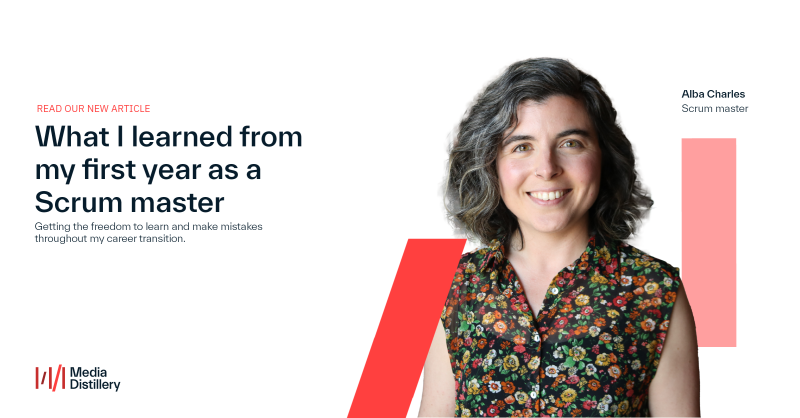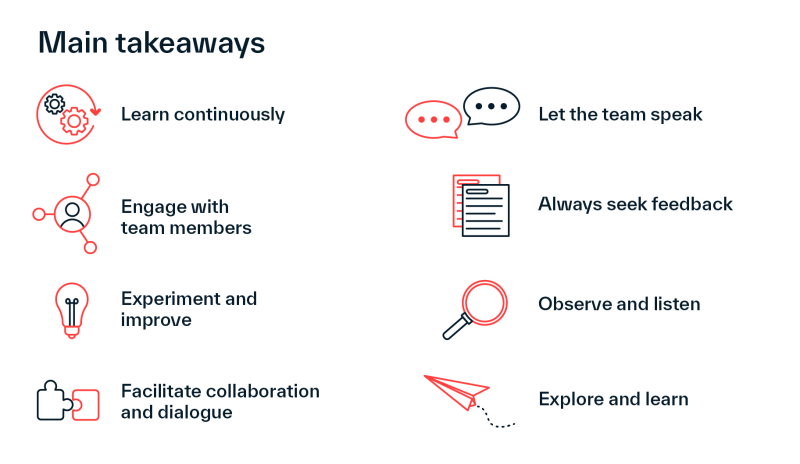First Year as a Scrum Master at Media Distillery
Following the successful presentation of Alba Charles at the Online Scrum Master Summit 2023, we decided to ask her about her career path, the challenges she faced during her professional transition, and her tips for beginners in Scrum. Read her story below!

Alba Charles about her career transition to Scrum Master
Can you tell us a bit about yourself?
My name is Alba Charles. I'm from Catalonia and moved to the Netherlands 7 years ago. It has been 3 years since I joined Media Distillery. I started as a Product Support agent and then moved into the role of a Scrum Master.
What made you decide to join Media Distillery?
It started with a recommendation from a former colleague named Adrian. We used to work together, and he later became a Product Support Coordinator at Media Distillery. He told me that it is a good workplace, so when he mentioned the job opening in the company, I thought it was worth trying.
How did you transition into the role of a Scrum Master?
After working as a Product Support agent for a year, I started to explore some training opportunities. I wasn't particularly interested in becoming a developer, so I reached out to others for suggestions. That's when someone recommended a Scrum Master training, which seemed to align better with my skills and interests. Although I had no prior knowledge of what a Scrum Master does, I did some research and had discussions with colleagues who have worked as Scrum Masters before. Based on their insights, I decided to enroll in the training and make this transition.
How does the Scrum Master role meet your interests and expectations?
Before starting as a Scrum Master, I remember being excited about a project for a new customer. It involved a Spanish client with a unique product requirement that wasn't part of our existing offerings. I was interested in the project and wanted to contribute in a non-technical way. That's when I discovered the value of being a facilitator and organizer. I enjoyed collaborating with the customer to define the project and found it to be in line with the responsibilities of a Scrum Master.
What did you think about the training?
The training I took was provided by the Scrum Alliance, and specifically designed for beginners. It lasted three days and was packed with valuable information. What I particularly enjoyed was the diverse group of participants from all over the world, which provided a variety of perspectives. The course focused on Scrum and its events, offering some practical exercises for us to apply what we learned.
What was the most significant realisation for you in this training?
One of the biggest realisations I had during my training was that, despite our different starting points, we were all equally learning.
As a newcomer, I expected others to have more experience than me, but the training showed that we were all on a learning journey together. This understanding led me to realise that being a Scrum Master is not a one-time achievement, but rather a continuous learning process. Last year, I enrolled in another six-month course, where we had lessons every two weeks. It was interesting to see that, despite varying levels of experience among participants, we all did the same exercises and faced similar doubts. It solidified my belief that continuous learning is key to this career.
What were your next steps after the training?
After the three-day training, we took an exam, and upon passing, I received my Scrum Master certification. I can still recall holding the certificate in my hands and pondering the question, "Now what?"
As the course didn't provide check-ins or guidance, it was up to us as students to explore, experiment, and seek advice. Fortunately, I had the opportunity to discuss and receive advice from my colleagues that were Scrum Masters before. This helped me to find a direction in my new role as a Scrum Master.
What were the challenges you faced when taking your first steps as a Scrum Master?
The role of a Scrum Master involves a lot of facilitating, coaching, and teaching the team, which can feel overwhelming for a beginner. So, during my first year, I focused on becoming a better facilitator for Scrum events like retrospectives and daily meetings within the company. I spent time reading about different brainstorming techniques and engaging in group activities to keep team members actively involved. It worked best for me to focus on one aspect at a time.
What have been your main areas for improvement?
I realised with time that an excessive focus on facilitating sometimes led to mistakes. For example, during our Daily Scrum, I would take the lead and act like a teacher, pointing at people to provide updates on their work. Meanwhile, the goal of those meetings was actually to discuss what needed to be done that day.
My second mistake was that I wasn't spending enough time talking to my team members to understand their needs and concerns. A real Scrum Master should be an active member of the team and have a good grasp of what's going on. As a beginner, I struggled to get a holistic view of the matter and dwelled on the details too much. Not communicating with the team members obviously did not help the situation. To address this, I started actively engaging with the team and discussing everything openly.

Key Takeaways for Beginners in Scrum
How would you describe the importance of Scrum Master within a team?
In my opinion, having a dedicated Scrum Master is crucial for the team's success. Before I joined Media Distillery, some developers used to fulfill the Scrum Master role part-time. However, this arrangement often creates challenges because developers and the product owner have their own opinions and priorities. A Scrum Master should be impartial and ensure effective collaboration within the team.
Of course, the specific tasks of a Scrum Master can vary depending on the company.
At Media Distillery, we have a lot of freedom, which creates a fantastic environment for learning and experimenting. This freedom allows me to try different approaches with the team, as not all teams work in the same way.
Let's talk about how you've evolved since the beginning of your career change. How would you compare Alba from your first year to Alba now?
In the beginning, I spent a lot of time researching how to improve things on my own. I would experiment with different approaches, even if I wasn't always confident about them. Now, I am still learning and reading a lot, but I don't try to solve everything independently.
I used to feel a bit intimidated about asking for feedback, but now I'm eager to receive it, learn from it, and seek ways to improve.
How do you see the connection between your previous career as a journalist and your current role as a Scrum master?
Journalism and being a Scrum Master have more in common than one might think. In both roles, asking questions is crucial. Just as a journalist can't write a story without reliable sources, a Scrum Master needs people to contribute their insights and experiences to create a comprehensive understanding of the project. Both roles require active engagement with others and the ability to extract valuable information.
How did your Scrum Master career change you personally?
Firstly, being a Scrum Master has taught me patience. When something isn't going well within the team, it often takes time to resolve it. I had to come to terms with the fact that change doesn't happen as quickly as I might want it to.
Secondly, in my conversations with others, I've learned to ask open-ended questions instead of closed-ended ones. This approach encourages people to open up and share their thoughts more freely.
Additionally, I strive to be as impartial as possible and understand different perspectives. Rarely is something completely right or wrong, so it's essential to listen and find a balanced perspective.
Lastly, I've become more attentive to the dynamics of a group. If I notice someone being quiet or not participating in a conversation, I make an effort to involve them and ensure everyone is engaged. I've become more attuned to people's emotions and reactions, paying closer attention to how they're feeling and responding.
What plans do you have for the future?
Over the past two years, I've transitioned from a facilitator role and completed a course on Scrum with Kanban. Kanban is another agile way of working that can be combined with Scrum. Currently, my plan is to continue with more training and gain a broader understanding of the Scrum Master role, aiming to improve in other areas. I can see myself transitioning from a team-focused role to one where I contribute to the overall organisation. Rather than solely working within a team, I would like to help the entire organisation by applying my expertise as a Scrum Master.
July 25, 2023
